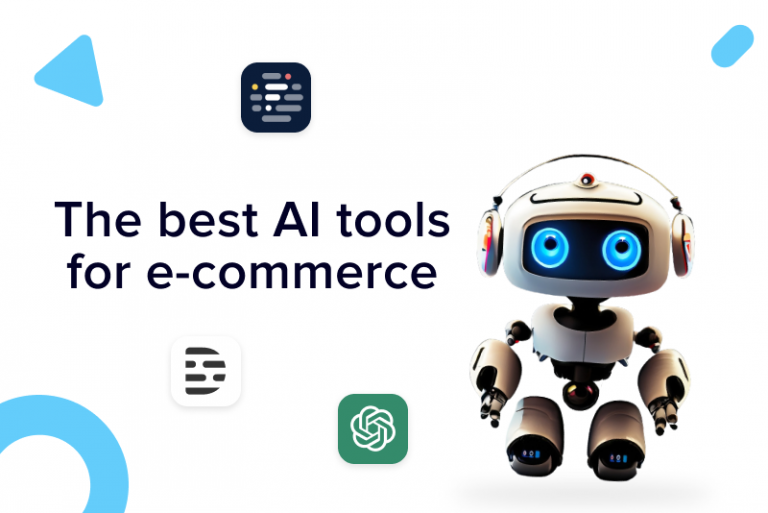I. Introduction
In today’s competitive e-commerce landscape, it’s crucial to stay ahead of the game and make use of the latest technology to enhance your online store. That’s where the power of AI comes in. With the help of AI tools, you can streamline your online store, automate mundane tasks, and provide a personalized shopping experience to your customers. In this article, we’ll explore the best AI tools available in 2023 that can help take your online store to the next level.
By leveraging AI tools, online store owners can gain valuable insights into customer behavior, optimize their marketing efforts, and improve the overall shopping experience for their customers. With AI, you can automate time-consuming tasks such as inventory management, pricing, and order processing, allowing you to focus on more strategic aspects of your business. So, if you’re looking to boost your online store’s performance and stay ahead of the competition, keep reading to discover the best AI tools for 2023
II. Understanding AI and Its Role in Online Retail
Artificial intelligence (AI) has transformed the way online stores operate by offering retailers the ability to automate and streamline their business processes.
AI is a technology that enables machines to perform tasks that typically require human intelligence, such as natural language processing, image and speech recognition, and decision-making. In online retail, AI tools can be used to automate tasks such as inventory management, customer service, product recommendations, and fraud detection.
By using AI tools, online retailers can improve operational efficiency, enhance customer experiences, and increase sales.

The use of AI tools in online retail has grown rapidly in recent years, and it is expected to continue to expand in the coming years. According to a report by Statista, the global market for AI in retail is expected to reach $19.9 billion by 2025.
Furthermore, a survey conducted by Retail Systems Research found that 45% of retailers are already using AI or plan to implement it within the next two years. As the use of AI in online retail becomes more widespread, it is important for retailers to understand its benefits and how to best utilize it to enhance their business.
III. Top AI Tools for Managing Online Stores
Artificial Intelligence (AI) tools can help online store owners to manage their stores more efficiently and improve their customer experience. AI-powered product recommendations and personalization can help retailers tailor their offerings to individual shoppers’ preferences.
This can lead to increased customer engagement and higher sales. Chatbots are another popular AI tool for online retailers. Chatbots use natural language processing (NLP) to understand customer inquiries and provide personalized responses. This can help retailers respond to customer queries and concerns in real-time, improving customer satisfaction.

AI-powered inventory management systems can help retailers optimize their inventory levels and improve their supply chain management.
These tools use machine learning algorithms to analyze data such as historical sales, current inventory levels, and seasonality to predict demand and optimize stock levels. This can help retailers reduce inventory costs and avoid stockouts.
Another essential AI tool for online retailers is fraud detection and prevention tools. These tools use machine learning algorithms to analyze data and identify patterns of fraud. By detecting and preventing fraud, retailers can reduce losses and protect their customers’ sensitive information.
IV. Using AI to Improve Customer Experience
AI tools can help online retailers to improve customer experience by personalizing the shopping experience. AI-powered product recommendations and personalization tools can help retailers understand customers’ preferences, past purchases, and browsing history to offer tailored product recommendations.
By personalizing the shopping experience, retailers can increase customer satisfaction, reduce bounce rates, and boost sales.
AI-powered chatbots can also enhance customer service by providing quick and efficient responses to customer queries. With the help of Natural Language Processing (NLP), chatbots can understand and respond to customer queries in real-time.

They can also provide customers with personalized assistance based on their purchase history and preferences, improving customer engagement and loyalty. By automating customer service, online retailers can reduce response times, save time and money, and provide 24/7 support.
AI can also streamline checkout and payment processes by using predictive analytics to anticipate customer needs and preferences. AI-powered payment systems can automatically suggest the most convenient payment methods for customers based on their location, device, and other relevant factors.
By streamlining the checkout process, retailers can reduce cart abandonment rates, increase conversion rates, and improve overall customer satisfaction.
V. Optimizing Business Operations with AI
Online retailers can optimize their business operations with the help of AI tools. AI-powered inventory management and restocking can help online store owners keep track of their inventory levels and automate the restocking process.
This can save time and resources and ensure that the store always has the right products in stock to meet customer demand. AI-powered sales forecasting and optimization can help online retailers predict demand and optimize pricing to increase sales. By analyzing data on customer behavior and sales trends, AI tools can provide insights that help online retailers make better business decisions.
In addition to inventory management and sales forecasting, AI-powered marketing automation and analytics can help online retailers streamline their marketing efforts. AI tools can analyze customer data to create targeted marketing campaigns that are more likely to reach the right audience.
They can also track the performance of marketing campaigns in real-time and provide insights into how they can be improved. By automating marketing tasks and analyzing performance data, AI tools can help online retailers save time and resources while increasing their reach and sales.
VI. Overcoming Challenges of Using AI in Online Retail
As with any new technology, there are challenges associated with implementing and using AI tools in online retail. One of the biggest challenges is integrating these tools with existing systems and processes. This can be a time-consuming and complex process, but it’s essential to ensure that the AI tools are working effectively and efficiently.
It may require significant investment in technology infrastructure and skilled personnel to make it work.
Another challenge is addressing privacy and security concerns that arise from the use of AI tools in online retail. As AI tools gather more data about customers and their behaviors, there is a risk of data breaches or misuse of that data.

It’s important for online retailers to have strong data privacy policies in place and to ensure that all AI tools are compliant with data privacy laws and regulations. Additionally, it’s important to implement security measures such as encryption and authentication to protect against cyberattacks.
Finally, overcoming resistance to AI from employees and customers can also be a challenge. Some employees may be resistant to change or feel threatened by the introduction of new technologies. Similarly, some customers may have concerns about the use of AI in online retail, such as the fear of being replaced by robots.
It’s important for online retailers to communicate the benefits of AI tools to both employees and customers and to provide training and support to ensure they are comfortable using them.
VII. Conclusion
In conclusion, AI tools have transformed the way online stores operate and interact with their customers. The implementation of AI-powered tools has made it easier to personalize shopping experiences, improve customer service, optimize business operations and overcome some of the most pressing challenges in online retail.
While there may be challenges to implementation and integration of AI tools, the benefits they bring are far-reaching and will continue to drive the growth of online retail.
We hope this article has helped you understand the importance of AI tools and their role in streamlining online stores. By leveraging the power of AI, you can enhance the customer experience, optimize business operations, and ultimately grow your business.
If you haven’t already, we encourage you to explore the AI tools available through VetrinaLive and see how they can transform your online store in 2023 and beyond.
References
- Personalization Statistics Every Marketer Should Know. (2022, January 20). Retrieved March 22, 2023, from https://www.optimizely.com/insights/personalization-statistics/
- Hernandez, R. (2022, March 9). Chatbots 101: What they are, and how they’re transforming retail. Retrieved March 22, 2023, from https://www.retailcustomerexperience.com/blogs/chatbots-101-what-they-are-and-how-theyre-transforming-retail/
- Liu, L., & Wu, L. (2020). An inventory management system based on artificial intelligence. Journal of Ambient Intelligence and Humanized Computing, 11(3), 1067-1077.
- Bagozzi, R. P., Gopalakrishnan, S., & Pakenham, J. (2019). The role of artificial intelligence in detecting and preventing fraud. Journal of Business Research, 98, 365-380.



